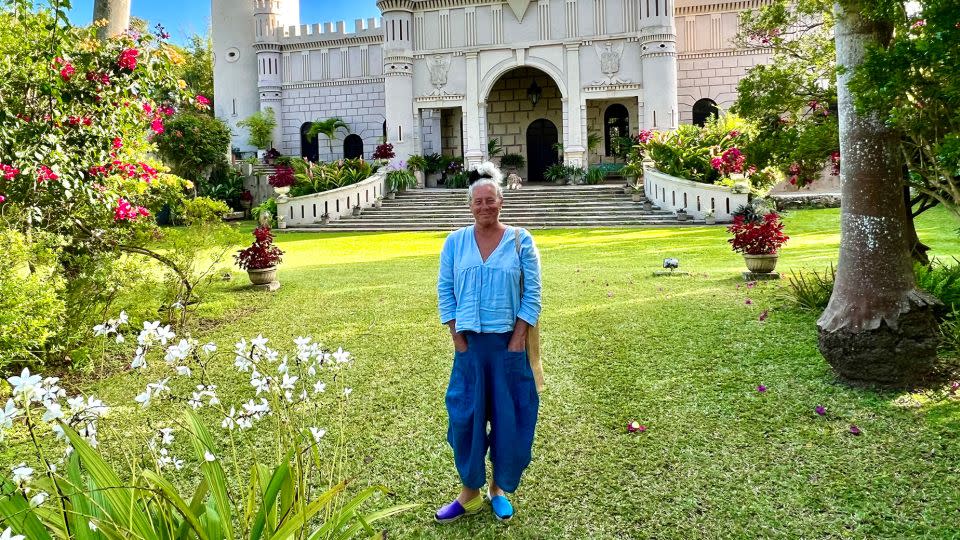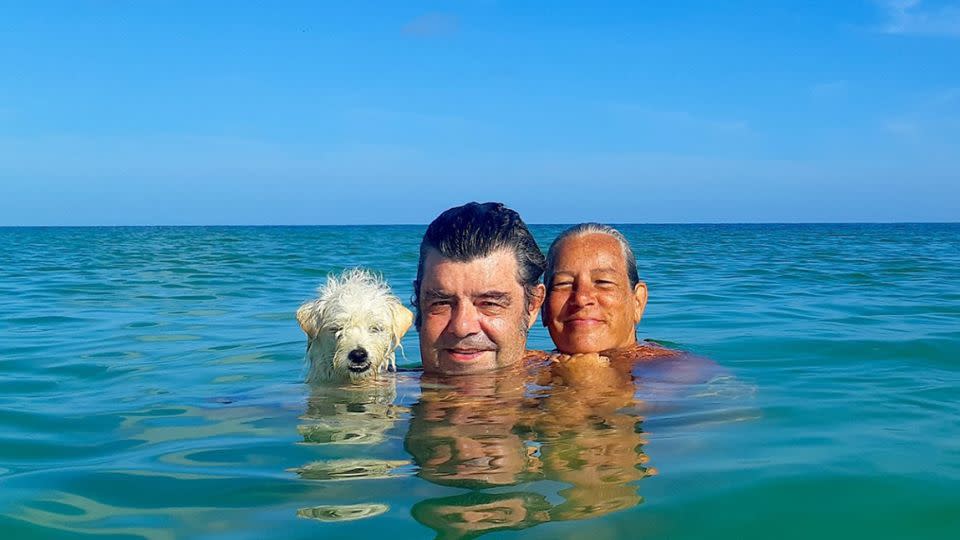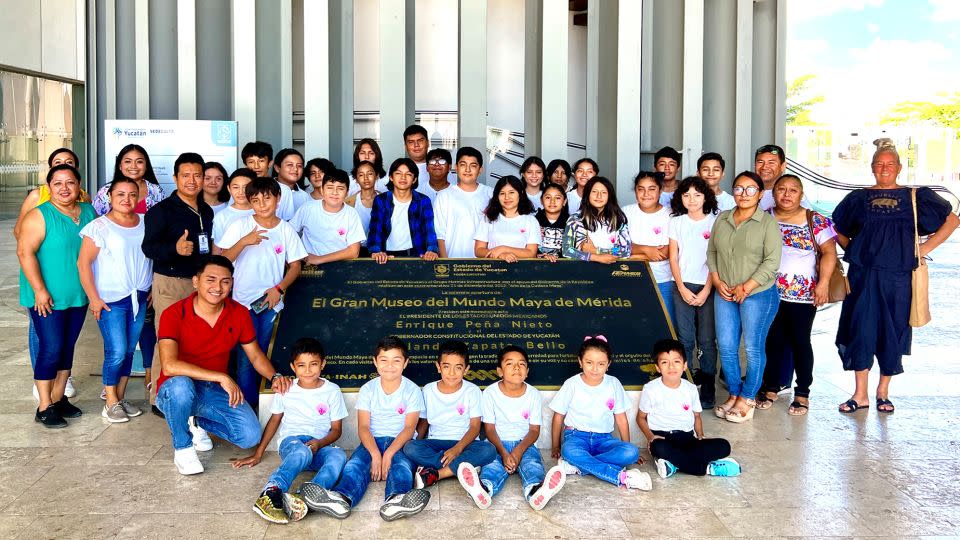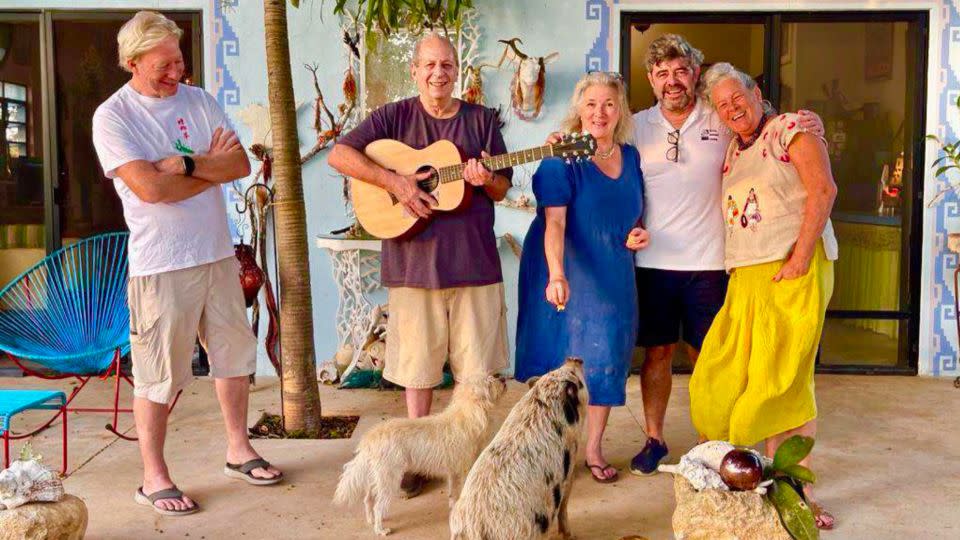Disillusioned with life in the US, she moved to Mexico seven years ago. Here’s how it completely changed her life
Her love affair with Mexico began at a young age, and Marjorie Skouras’ passion for the country only grew with the passing of time.
The interior designer, originally from California, first traveled over to visit her uncle, who lived in Baja California, when she was a teenager and continued to visit regularly during her 20s.
“That’s kind of how it all started for me,” Skouras, who studied pre-Columbian art at UCLA, tells CNN Travel.
“The wonder of it all was probably never ever to be repeated in my life. It was that fabulous.”
Lifelong dream

As Skouras’ career developed and she started a family, her visits became less frequent, but her affection for the country remained.
While her family had lived in California for generations, Skouras was becoming more and more disillusioned with life there, and began flirting with the idea of relocating to a different country once her daughter had graduated from high school and left for university.
“It was just becoming increasingly complicated, difficult and expensive to live there [in California,]” she says. “And for quality of life, it was diminishing.”
She considered moving to the island of Corfu in Greece, where she had met her husband, Bruno Bardavid, as well as some other destinations in Europe, but ultimately decided against it.
In July 2014, Skouras found herself back in Mexico and paid a visit to the Yucatán city of Merida, a place she’d heard much about, but had never actually visited.
“We started to come down here to see what it looked like, and we knew within 45 minutes that we wanted to live here,” she says. “It was super weird. Never happened to me in my life before.”
Once they returned home, Skouras began searching for a property in Merida online and went on to buy a 19th century ruin for $210,000 four months later.
“Our house was grand by local standards,” she says of the home, which they spent around two years restoring.
“But you could buy less grand houses for so little money that it was astonishing. That’s all completely changed [now].”
Skouras and Bardavid officially moved to Merida in 2017.
“It was like a fantasy,” she says. “You read all those books about people who do it. My daughter and I watched ‘Under the Tuscan Sun,’ ritualistically every year.
“There’s always been that pull, that concept of leaving. And there was a sense of, ‘You did it, how weird. And here you are now.’”
The fact that both Skouras and her husband, who was born in Argentina, spoke Spanish made the transition much easier.
“There are a lot of people who’ve been here for over 10 years who don’t speak any Spanish at all,” she says. “And I find that to be so peculiar.”
Spanish language

Being able to speak the language also meant that the couple were able to connect with locals relatively easily, which has been “a gateway to a more interesting life,” according to Skouras.
“We very much enjoy spending time with the Mexicans as opposed to just being in that expat community who does not speak Spanish,” she adds.
Skouras describes their first few years in Merida as “magical,” explaining that the city attracted creative people from all over the world at the time.
“It was like a tribe of people that were really interesting to hang out with,” she says. “And the parties were really fun. People were doing a lot of cool stuff.
“It was really truly, truly amazing.”
While the transition to life in Mexico was pretty easy for Skouras, she admits that the country’s approach to time is something that she has always struggled with.
“Time does not exist as you or I understand it,” she says. “ You can say [a] time, but it doesn’t really mean anything.
“Living in the United States, it runs more or less like clockwork in terms of that sort of stuff.
“And here, it just doesn’t, and nobody’s bothered by it, or really cares. And they seem very surprised if you’re concerned.”
She says Bardavid found it quite easy to adapt to this approach, but it’s been more difficult for her.
“I still struggle with it,” she admits. “But 99.9% of the time, the thing gets done, and usually it gets done well.
“It’s considered rude to be in a hurry, literally. And I have to remind myself of that.”
As she settled into life in Mexico, Skouras, who had long been a fan of Mexican fashion, began ordering vintage dresses from the 1960s and ’70s to wear out and about, and often received compliments on the clothing.
Feeling inspired, she decided to open up a boutique near her home in order to showcase the collection of dresses, as well as sell some of her own products, in 2019.
“That was really fun and weird,” she says. “And then Covid came and everything kind of shapeshifted again.
“But at the same time, I realized that that wasn’t the end. I hadn’t arrived. And since then we’ve done this totally different thing.”
Musical connection

In 2021, Skouras and her husband bought a 10 acre stretch of land in Dzemul, a city with a population of around 3,000, and went on to sell their home in Merida.
As they set about building a compound in Dzemul, the couple noticed that there were some extremely deprived sections of the area, and wanted to find a way to help the local children in some way.
“We come here thinking that you have to leave to have a better life, and that is not the viewpoint here at all,” she says.
“But there will be an occasional child who wants to go out to see the bigger world, so how could we help to make that a reality?
“Music and sports are the two obvious ones. So music became the concept, as my husband and I are both ardent fans.”
The couple launched the nonprofit Kookix Music School, which offers free music classes for children of all ages, in September 2021, funding the project themselves.
“We spent half the money that we had saved to build a house out here on that,” she says. “Because we just felt like that was the right thing to do.”
While Skouras entered Mexico with a temporary visa, she is now a permanent resident and is currently applying for Mexican citizenship.
“I love the country,” she adds. “I love the people. And I’d be super, super proud if they accept me. We’ll find out soon.”
In 2022, Skouras’ collection of Mexican dresses was exhibited at the Museo del Arte Popular de Yucatán in Merida, something she describes as a “remarkable and magical experience.”
Tropical storms

While “fires, earthquakes and landslides’” were a constant concern while she was in California, living in Mexico hasn’t exactly meant that Skouras has been able to put natural disasters behind her.
“Here, it’s hurricanes,” she says. “But knock on wood, it’s been 20 years since the last direct hit, where we are. We get heavy tropical storms that are spectacular.”
When it comes to the cost of living, Skouras explains that while gas is less expensive in Mexico, groceries prices can vary, with some of the larger supermarkets “more or less on par” with prices in major supermarkets in the US.
Skouras is often contacted by others who’ve been mulling over the prospect of relocating to Mexico for a while, and tends to advise people to just “do it.”
“It changed our lives in so many meaningful ways that we could never have possibly dreamt up or imagined,” she says.
“It’s a place filled with magic and delight. And there are people offering all sorts of services for people who do not speak the language to ease your future entry, and to help you with your life once you are here.
“So it’s not particularly difficult [to adjust], I think. There are people from all over who come and realize that it’s a great place to be.”
Americans can apply for temporary residence visas allowing them to stay in Mexico for up to four years provided they can prove “economic solvency.”
Perhaps unsurprisingly, the question of safety often comes up when Skouras is asked about her new life in Mexico.
The US State Department currently has “do not travel” advisories in place for six of Mexico’s 32 states, with crime and kidnapping listed as the cause for advisories for the majority.
Although Skouras concedes that there are problems in some sections of the country, she stresses that she’s always felt “completely safe” while living there.
“It’s such a ridiculous question on so many levels, when you compare it to what’s going on in the United States,” she says. “For the moment, we’re completely safe. There’s nothing going on here.”
Seven years after packing up her life in California and heading for Mexico, Skouras’ appreciation for the country, and its people, is stronger than ever.
She travels back to the US around twice a year, but has no plans to return, hoping to remain in Mexico for as long as possible.
“As we go through time here, our connections to the Mexican communities have become much deeper and allowed for a completely different experience,” she says.
“To the extent that we both believe that, for the foreseeable future, we will stay here.”
For more CNN news and newsletters create an account at CNN.com


